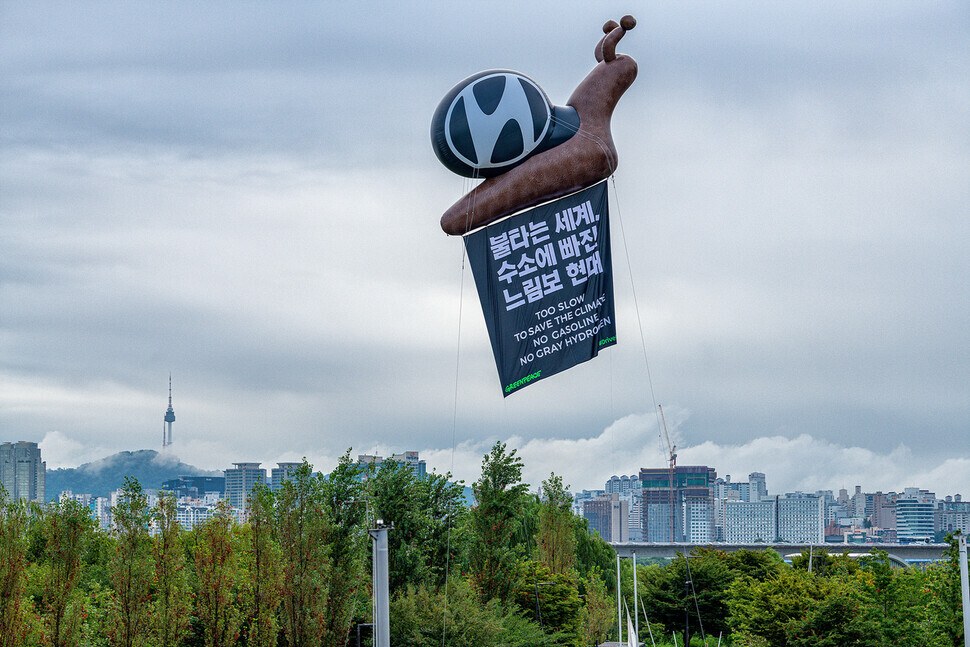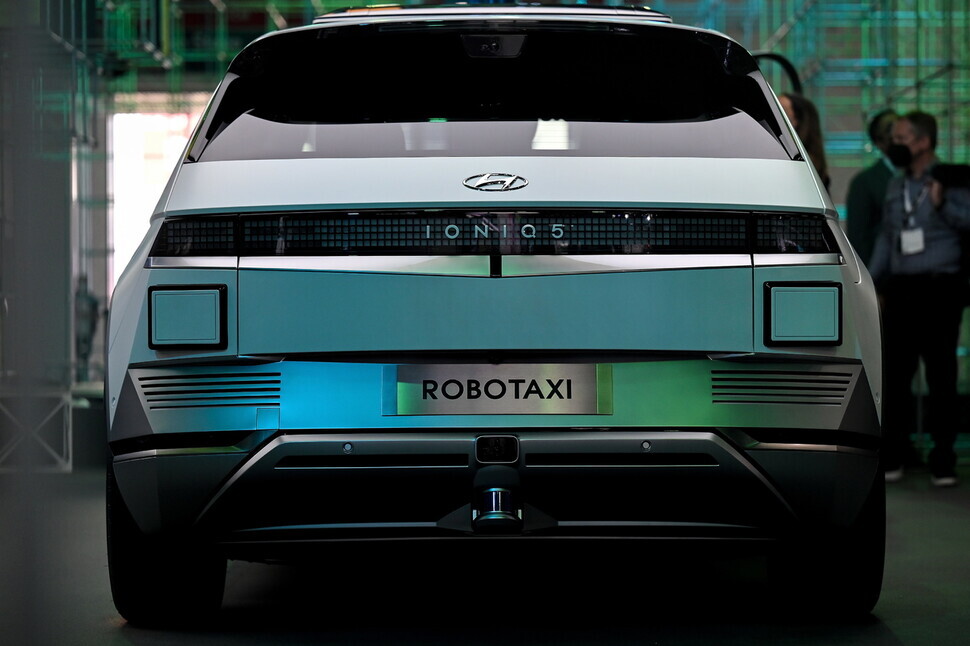hankyoreh
Links to other country sites 다른 나라 사이트 링크
Environmental groups unsatisfied with Hyundai’s hydrogen promises

The Hyundai Motor Company has announced plans to roll out hydrogen fuel cell systems in all its commercial vehicles, including buses and trucks, by 2028, and to stop selling cars with internal combustion engines in Korea in 2040. But climate advocates and environmental groups aren’t impressed.
Hyundai Motor unveiled its medium- and long-term strategy for hydrogen cars at the “Hydrogen Wave” event held on Tuesday. The company plans to expand its hydrogen operation beyond regular cars to trucks, sports cars, trams and urban air mobility and to make hydrogen fuel cells as economic as electric car batteries by 2030.
Hyundai Motor CEOChang Jae-hoon delivered a speech about the company’s vision for achieving carbon neutrality on Monday at the International Mobility Show, the world’s largest automobile fair, which was held in Munich (rather than in Frankfurt, as in previous years). Under the plan that Chang laid out, Hyundai Motor will stop producing and selling cars with internal combustion engines in 2035 in Europe and in 2040 in other major markets including the US, China and Korea, with the company reaching carbon neutrality in 2045.
South Korean newspapers have generally covered these plans positively. But major environmental groups have been critical.
First, Greenpeace criticized Hyundai’s hydrogen car plan on the grounds that hydrogen can’t be the answer to the climate crisis because of the nature of the technology. Due to technological limitations, the hydrogen production process, which uses water and natural gas, inevitably releases carbon dioxide. For this reason, they call it “gray hydrogen.”
In the short term, Hyundai Motor says it intends to resolve this by developing “blue hydrogen,” which is made using carbon capture technology. But even this approach doesn’t look promising. According to a paper published last month by researchers from Stanford University and Cornell University, blue hydrogen is only 9-12 percent more effective at reducing greenhouse gas emissions than gray hydrogen, which is also produced with natural gas.
Hyundai Motor has said that, in the long term, it will produce “green hydrogen,” which is based on renewable energy. But that technology hasn’t been developed yet.
Greenpeace also says that hydrogen cars are only half as energy efficient as electric vehicles, meaning they can only do half the work for the same energy input.
The vision for increasing the proportion of electric and hydrogen vehicles to 30 percent by 2030 is also facing criticisms for failing to match the road maps established by Europe, the US and international organizations.
US President Joe Biden signed an executive order on Aug. 5 to have zero-emission vehicles comprise half of all new vehicles produced by the year 2030.
In May, the International Energy Agency presented a roadmap for achieving “net zero by 2050” — referring to zero net emissions of the carbon dioxide responsible for accelerating global warming — which included a recommendation to stop selling internal combustion engine vehicles (ICEVs) worldwide as of 2035.
In July, the European Union (EU) unveiled a climate crisis policy package in which it declared a ban on ICEV sales as of 2035, including hybrid vehicles.
Greenpeace called for moving up the timeline for discontinuing ICEV production and sales to 2030, noting that 16 percent of global greenhouse emissions occur in the transportation sector and demanding that Hyundai Motor act responsibly regarding transportation-related emissions as a global automaker.
Quoting a Hyundai Motor report stating that around 32 percent of its global sales last year were in emerging markets such as Russia, India, the Asia-Pacific region and Central and South America, Greenpeace said that for the sake of a climate crisis response, the achievement of carbon neutrality and halt to ICEV sales should take place worldwide rather in particular countries or regions.

“Hydrogen vehicles and the hydrogen economy don’t help us to achieve carbon neutrality, since they rely on ‘gray’ and ‘blue’ hydrogen,” said Kim Ji-seok, a climate and energy specialist at Greenpeace.
“Discontinuing ICEV sales by 2030 would conserve time and resources [for the climate crisis response],” he said.
Im Jae-min, secretary general of Energy Transition Forum Korea, said, “Hyundai Motor claims that it will be marketing EVs and hydrogen vehicles for its new models beginning in 2040, but ICEVs launched before that could still be sold in 2040.”
In response, a Hyundai Motor public relations official said, “As of late last year, the EU’s production discontinuation target for ICEVs was also 2040. We’ve been working to stop [sales] by 2035 to meet the regulations from last July.”
Last year, Hyundai Motor sold upwards of 3.74 million vehicles worldwide, including more than 790,000 in South Korea and 2.95 million overseas. Electric and hydrogen vehicles comprised around 104,000 of them, or 2.8 percent.
By Choi Woo-ri, staff reporter
Please direct questions or comments to [english@hani.co.kr]

Editorial・opinion
![[Guest essay] Maybe Korea’s rapid population decline is an opportunity, not a crisis [Guest essay] Maybe Korea’s rapid population decline is an opportunity, not a crisis](https://flexible.img.hani.co.kr/flexible/normal/500/300/imgdb/original/2024/0430/9417144634983596.jpg) [Guest essay] Maybe Korea’s rapid population decline is an opportunity, not a crisis
[Guest essay] Maybe Korea’s rapid population decline is an opportunity, not a crisis![[Column] Can Yoon steer diplomacy with Russia, China back on track? [Column] Can Yoon steer diplomacy with Russia, China back on track?](https://flexible.img.hani.co.kr/flexible/normal/500/300/imgdb/original/2024/0430/1617144616798244.jpg) [Column] Can Yoon steer diplomacy with Russia, China back on track?
[Column] Can Yoon steer diplomacy with Russia, China back on track?- [Column] Season 2 of special prosecutor probe may be coming to Korea soon
- [Column] Park Geun-hye déjà vu in Yoon Suk-yeol
- [Editorial] New weight of N. Korea’s nuclear threats makes dialogue all the more urgent
- [Guest essay] The real reason Korea’s new right wants to dub Rhee a founding father
- [Column] ‘Choson’: Is it time we start referring to N. Korea in its own terms?
- [Editorial] Japan’s rewriting of history with Korea has gone too far
- [Column] The president’s questionable capacity for dialogue
- [Column] Are chaebol firms just pizza pies for families to divvy up as they please?
Most viewed articles
- 1First meeting between Yoon, Lee in 2 years ends without compromise or agreement
- 2Under conservative chief, Korea’s TRC brands teenage wartime massacre victims as traitors
- 3[Guest essay] Maybe Korea’s rapid population decline is an opportunity, not a crisis
- 4Months and months of overdue wages are pushing migrant workers in Korea into debt
- 5[Column] Can Yoon steer diplomacy with Russia, China back on track?
- 6After election rout, Yoon’s left with 3 choices for dealing with the opposition
- 7‘We must say no’: Seoul defense chief on Korean, USFK involvement in hypothetical Taiwan crisis
- 8Two factors that’ll decide if Korea’s economy keeps on its upward trend
- 9Dermatology, plastic surgery drove record medical tourism to Korea in 2023
- 10[Editorial] Japan’s rewriting of history with Korea has gone too far